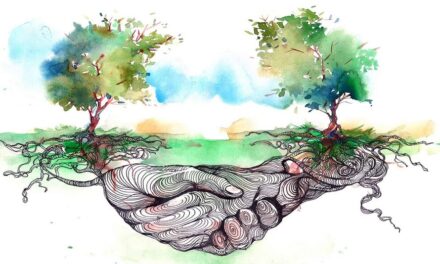It’s about how you relate the present to past and future
When he was 29 years old, Eckart Tolle found peace overnight — literally.After years of troubled living punctuated by episodes of depression, Tolle went to bed plagued by his usual, haunting late-night thoughts. This time, however, he began questioning them.
“Why does my life feel unbearable? Why do I keep having these thoughts?” The answers came to him in the form of a powerful, internal epiphany. “Resist nothing,” his inner voice said. He fell into a deep sleep, and when he awoke, he felt “no more fear,” in his own words.
He spent the next day walking around, wandering, observing, fully engaged in the present moment — a state he continued to exist in for several years. Only when people asked him more and more questions did he begin to feel a sense of duty towards sharing his new, mindful approach to life.
Eventually, he became a teacher and, ultimately, codified his knowledge in The Power of Now, a global bestseller of over 20 years. Whether you believe in such spiritual awakenings or not, there are good lessons to be learned from what Tolle describes as the separation from his “I,” the ego-centered, thought-driven entity we all form in our minds.
Here are three that will help you live in the most beautiful place in the world: the present.
Two of the strongest, most common bad feelings that affect our lives negatively each and every single day are regret and worry. Why is that?
Every waking minute, we’re engaged in a constant stream of consciousness. Every second, one thought follows the next in our head, and those thoughts mainly relate to two things: the past and the future. This is where our big preoccupation with regret and worry comes from.
When you wake up ten minutes late in the morning, what’s your first thought? “Crap, I overslept!” This thought will likely be followed by, “I’ll probably be late for work,” and voilà, you’ve dedicated your first two thoughts of the day to the past and the future — in other words, to regret and worry.
According to Tolle, the only important time is the one we think about the least: the present. Everything happens here. Everything you feel and sense takes place in the present. That’s all life is: A series of present moments.
The past is nothing more than all present moments that have gone by. The future is just a collection of all present moments waiting to happen. Hence, living in any moment other than the present is useless — even if your current task is oriented towards the future.
Let’s say you have a paper to hand in in two weeks. You can regret the time you didn’t use to work on it, but that’s not useful. Neither is worrying about the big load of work that is yet to come. The only good way to get the job done is to focus on what you can do right now: Calm down, sit, think, define the problem, come up with an outline, and start writing.
Life is a series of present moments, and the only one of this moments that you can really use is the one happening right now.
Or, in emperor Marcus Aurelius’ words: “If you are distressed by anything external, the pain is not due to the thing itself, but to your estimate of it; and this you have the power to revoke at any moment.”
Tolle connects this idea of “perspective is power” to his distinction between past, present, and future. He suggests all our pain is the result of resisting what we cannot change, and guess where the things we cannot change lie? They lie in the past and the future.
We think about the past and the future. What made us happy. What made us sad. What would make us happy, and what might make us sad. However, we control none of the events of either time; we can only live in the present.
It is when we fill the gap between the two — past and present or present and future — with resistance to what might happen or has happened, that we experience pain, be it psychological or physical. Your anger might take the form of a painful stomach or an irrational decision, but either way, it leads to more pain despite having originated only in your head.
Don’t wish back the past. Don’t resist the future. Accept life as is, and you’ll feel a lot less pain — particularly the imagined kind.
- Keep asking yourself, “What is my next thought going to be?”
- Observe your thoughts and urges, but don’t judge them.
The first technique borrows its concept from physics. Quantum particles are always in transience. We can for example determine where they are or when they are but never both at the same time. The only way to keep such a flurry system in its current state is to constantly observe it. Only then do its properties remain fixed. This is called the quantum zeno effect.
When it comes to mindfulness, asking yourself “What will my next thought be?” will delay your next actual thought, thus giving you valuable space to realize how much time you spend on autopilot. You’re interrupting your mind to separate yourself from it. You’ll also pick each thought more deliberately.
The second technique is more classic zen. It’s about listening and accepting without acting. Observe the nagging thoughts like “I should have woken up earlier!” but don’t let them take hold in your mind. Wave at them as they pass by. Notice, see, accept — but don’t give in to your mind’s regretful and worrying tendencies.
In separating your physical, observing body from your restless mind, you’ll reduce the friction between present, past, and future, and thus reduce the pain you feel about everything you can’t change.
Summary
The Power of Now reveals every minute we spend regretting the past or worrying about the future is a minute lost. The only moment we can truly live in is the present, which is why the book delivers actionable strategies to live every minute as it occurs.
To rememberits powerful premise and spend less time regretting and worrying, here are 3 lessons worth keeping in mind:- Life is a series of present moments. Nothing more, nothing less!
- All pain results from resisting the things we cannot change, which we do because we focus on the gap between present and past or future rather than the moment at hand.
- To stay in the present and reduce how much pain you feel, constantly observe your thoughts without judging them and be deliberate about each next thought you choose.
![]()


























